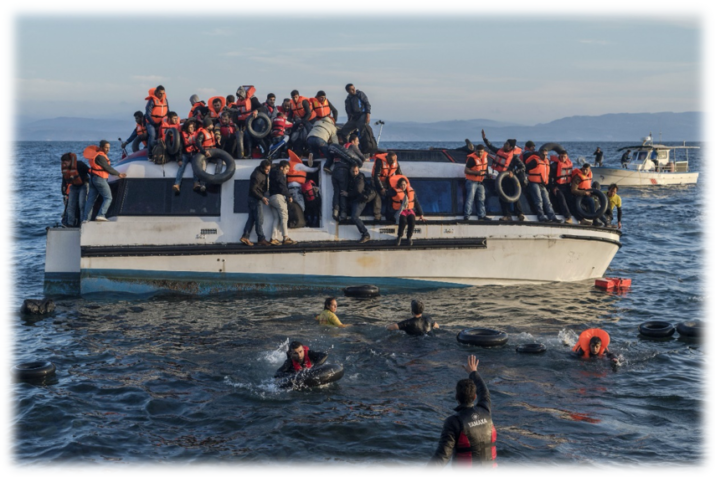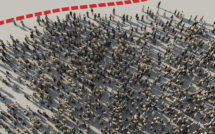

Course Description: Although people have been relocating for millennia, migration and related phenomena seem to have dominated our headlines in the last few years. Is migration happening on a larger scale today, or is this just a matter of perception? In this course, we will explore this question as we study migration to, from, and within Europe over the last 150 years. Additionally, we will ask why people choose to migrate, why some migrants maintain ties with their homeland and others do not, and how ways of talking about migration have changed over time. We will explore whether freedom of movement can be considered a fundamental “right,” and if so, how this can be balanced with the state’s role in providing security and maintaining its borders. Starting in the 1870s and ending with the 2015 Refugee Crisis, this course will use theoretical frameworks, global case studies, and individual stories to examine how population movements—and attempts to regulate them—have shaped and continue to shape the world as we know it.
Required Texts:
- Mavroudi, Elizabeth, and Caroline Rose Nagel. Global Migration: Patterns, Processes, and Politics. Routledge, 2016. (ISBN: 9780415683869).
- Kingsley, Patrick. The New Odyssey: The Story of the Twenty-First Century Refugee Crisis. W W Norton & Co Inc, 2017. (ISBN: 9781631492556 1631492551)
- Zahra, Tara. The Great Departure: Mass Migration from Eastern Europe and the Making of the Free World. New York: W.W. Norton & Company, 2016. (ISBN: 0393353729
9780393353723).
**Note: All texts are available for short-term check-out at the Music & Media Library or online via EReserves**
Course Objectives
By the end of the course, students will have gained:
- An understanding of key theories, terms, and frameworks related to migration studies,
- A chronological foundation of major events and developments in European migration history during the 20th
- Experience in reading, writing, discussion-leading, and presenting,
- The ability to analyze current events, images, and news articles in historical context.
- The ability to create timelines or informative charts using digital tools,
(Or personal experience volunteering with a refugee community)
Assignments:
- Migration in the Media Reflections & Timeline (50% of course grade): For this project, you will trace how issues surrounding migration, including immigrants, asylum-seekers, citizenship, and emigration, have been portrayed in the English-language media of a European country of your choosing. You will follow current updates by checking your chosen news outlet regularly and writing short reflections/analyses on a biweekly basis. The project will culminate in creating a digital timeline, which you will use to educate your classmates about developments regarding migration in your chosen country. You will also be asked to submit an Op-Ed piece or final analysis essay. More details regarding this project will be coming soon.
OR
- Project SHINE Involvement & Reflections (50% of course grade): Instead of the “Migration in the Media” semester assignment, you may choose to participate in Project SHINE (Students Helping in Naturalization & English) by volunteering with Atlanta’s refugee community. To receive full credit, you must attend orientation and all weekly volunteering events, as well as write weekly and final reflections and present briefly about your experiences at the end of the semester. More details regarding this assignment will be coming soon.
- Pop Quizzes/In-Class Essays (15% of course grade): These will take place at the beginning of the class meeting and will be directly related to the reading assigned for that day. These cannot be made up.
- Discussion Co-Leading (20% of course grade): Together with a classmate, you will lead a discussion about the day’s assigned reading(s) once during the semester. To receive full credit, you and your partner will need to submit your proposed discussion questions and outline by 3 p.m. on the day before your assigned discussion.
- Professionalism (15% of course grade): In order for everyone to get the most out of this course, your attendance and meaningful contributions are essential. Please arrive on time, with the readings completed, and be ready to discuss them. Arriving late or having more than one unexcused absence will negatively affect this portion of your grade.
Semester Schedule:
UNIT 1: KEY TERMS & CONCEPTS IN STUDYING MIGRATION
January 16: Course Introduction
**Reflection/Mini-Bio DUE in Canvas by 11:59 p.m. on Monday January 21!**
- In approximately 500 words, please tell me a little about yourself, such as where you are from, your major, why you are taking this course, and what you hope to gain from it. If you feel comfortable sharing about your own “migration background” or family heritage as it relates to migration, please do so.
January 21: MLK Day; No Class
January 23: Migration: Myths & Misconceptions
- Visit from Johannes Kleiner from Project SHINE
- Introduction to “Migration in the Media” Assignment
- Mavroudi & Negel, Chapter 1, “Making Sense of Global Migration,” p. 1-27;
Chapter 2, “Global Migration in Historical Perspective,” p. 28-55
January 28: Border Politics & Passports
**Choice of Country for “Migration in the Media” Assignment DUE**
- Mavroudi & Nagel, Chapter 6, “Immigration Control and Border Politics,” p. 151-172
- Torpey, John, The Invention of the Passport: Surveillance, Citizenship, and the State, Chapter 4, “Toward the ‘Crustacean Type of Nation’: The Proliferation of Identification Documents from the Late Nineteenth Century to the First World War,” p. 93-121.
January 30: In-Class Film: “My Fake Passports and Me” https://vimeo.com/44804266
February 4: Regulating Migration
- Zahra, The Great Departure, Introduction, “Not a Golden Country,” p. 1-22 & Chapter 1, “Travel Agents on Trial,” p. 23-63
February 6: Statelessness and the Freedom of Movement
- Tara Zahra, ‘“Condemned to Rootlessness and Unable to Budge”: Roma, Migration Panics, and Internment in the Habsburg Empire,’ The American Historical Review, Volume 122, Issue 3, 1 June 2017, p. 702–726. (eReserves)
UNIT 2: KEY MOMENTS IN MIGRATION HISTORY
February 11: Diasporas & the Jewish Case
- Theodore Herzl, The Jewish State, p. 69-97; 123-157. Available online here: https://www.gutenberg.org/files/25282/25282-h/25282-h.htm
- Zahra, The Great Departure, Chapter 2, “The Man Farthest Down,” p. 65-103.
February 13: World War I and Refugees
- Gatrell, Peter, and Laycock, Jo. “Armenia: the ‘Nationalization’, internationalization and representation of the Refugee Crisis.” Homelands: War, Population and Statehood in Eastern Europe and Russia, 1918-1924, edited by Gatrell, Peter and Baron, Nick, 179-200. London: Anthem Press, 2004. (eReserves)
- Interview with Tenzin Namdul, a member of the Tibetan Diaspora (TBD)
February 18: Interwar Tensions & National Minorities
- Zahra, The Great Departure, Chapter 3, “Happy and Unhappy Returns,” p. 105-142
- Kobrin, “Polish Jewry, American Jewish Immigrant Philanthropy, and the Crisis of 1929” in 1929: Mapping the Jewish World, p. 93-106. Also available online through Emory’s library.
February 20: World War II, Displacement & Statelessness
- Zahra, The Great Departure, Chapter 5, “Work Will Set You Free,” p. 181-216
February 25: Memory and Trauma in Migration: The Holocaust
- Zahra, The Great Departure, Chapter 4, “The First Final Solution,” p. 143-180
- Spitzer, Hotel Bolivia, Chapter 1, “Desperate Departure.” (eReserves)
February 27: International Governance & Refugees
- UNHCR Protocol http://www.unhcr.org/en-us/about-us/background/4ec262df9/1951-convention-relating-status-refugees-its-1967-protocol.html
- UN Declaration of Human Rights: Foreword, Preamble, Articles 13-15. http://www.un.org/en/udhrbook/pdf/udhr_booklet_en_web.pdf
- Mavroudi & Nagel, Chapter 5, “Refugees,” p. 118-145
March 4: Decolonization & Migration
- Alba, Richard, and Roxane Silberman. “Decolonization Immigrations and the Social Origins of the Second Generation: The Case of North Africans in France.” The International Migration Review 36, no. 4 (2002): 1169-1193. (eReserves)
March 6: Integration, Assimilation & Ethnic Enclaves
- Diner, Hungering for America, Chapter 3, “The Bread is Soft”, p. 48-83. (eReserves)
- Mavroudi & Nagel, Chapter 8, “Migrant Identities, Mobilizations & Place-Making Practices,” p. 205-224
**Extra Credit: Share a snack with the class and briefly present its migration connection**
SPRING BREAK; No Classes
- Continue working on your MITM Projects
March 18: Migration & the Cold War
- Zahra, The Great Departure, Chapter 7, “The Freedom Train,” p. 217-253
- Interview with Marysia Harbutt, a Polish woman who received asylum as a student at Berkeley in the 1960s (TBD)
March 20: Citizenship Law & Migration: Germany as Case Study
- “Germany: The Development of Migration and Citizenship Law in Postwar Germany,” The Law Library of Congress, 2017. PDF available on eReserves or here:
https://www.loc.gov/law/help/migration-citizenship/migration-citizenship-law-postwar-germany.pdf
March 25: After the Cold War
- Zahra, The Great Departure, Chapter 8, “Free to Stay or Go,” p. 255-291
March 27: “Multiculturalism”
- Stehle, M. (2012). White ghettos: The ‘crisis of multiculturalism’ in post-unification Germany. European Journal of Cultural Studies, 15(2), 167–181.
UNIT 3: MAKING SENSE OF MIGRATION TODAY
April 1: Multiculturalism (cont.) and the Media
- Patricia Ehrkamp (2010) The Limits of Multicultural Tolerance? Liberal Democracy and Media Portrayals of Muslim Migrant Women in Germany, Space and Polity, 14:1, 13-32
- Esses, V. M., Medianu, S. and Lawson, A. S. (2013), Uncertainty, Threat, and the Role of the Media in Promoting the Dehumanization of Immigrants and Refugees. Journal of Social Issues, 69: 518-536
April 3: Mixed Migration
- Kingsley, The New Odyssey, Chapter 2, “The Second Sea: The Desert Routes through the Sahara,” p. 27-54.
- Van Hear, Nicholas. 2011. “Mixed Migration: Policy Challenges,” The Migration Observatory, University of Oxford. Available on eReserves and at:http://www.migrationobservatory.ox.ac.uk/wpcontent/uploads/2016/04/PolicyPrimer-Mixed_Migration.pdf
April 8: The “Refugee Crisis”
- Kingsley, The New Odyssey, Chapter 5, “Shipwreck: How People Drown at Sea and How They Are Saved,” p. 119-152.
- Di Bartolomeo, A. and Jill Alpes. 2017. “The EU-Turkey Deal: What Happens to People Who Return to Turkey?” Forced Migration Review Available at: http://www.fmreview.org/sites/fmr/files/FMRdownloads/en/resettlement/tunaboylu-alpes.pdf
April 10: Brexit & Borders
- Goodman, Simon. “‘Take Back Control of Our Borders’: The Role of Arguments about Controlling Immigration in the Brexit Debate.” Rocznik Instytutu Europy Środkowo-Wschodniej, no. Vol. 15, z. 3 Minorities, diasporas, refugees in contemporary Europe (2017): 35–53.
- Kingsley, The New Odyssey, Chapter 9, “A Gate Clangs Shut: The Explosion of the Balkan Route, Europe’s Moral Crisis, and the Closure of the Hungarian Border,” p. 257-296.
April 15: “Fortress Europe”
- Kenan, Malik. “How We All Colluded in Fortress Europe,” The Guardian, June 10, 2018. https://www.theguardian.com/commentisfree/2018/jun/10/sunday-essay-how-we-colluded-in-fortress-europe-immigration
- Greenhill, Kelly M. 2016. “Open Arms Behind Barred Doors: Fear, Hypocrisy and Policy Schizophrenia in the European Migration Crisis.” European Law Journal 22 (3): 317–332
April 17: In-Class Debate
- Zahra, The Great Departure, Postscript, “Against the World,” p. 293-302.
- Kingsley, The New Odyssey, Chapter 10, “Status Pending: Hashem’s Anxious Wait for Asylum,” p. 297-317.
Week 15
April 22: Student presentations: Project SHINE or MITM
April 24: Student Presentations: Project SHINE or MITM
Week 16
April 29: Student Presentations & Wrap-Up
**Final Essays/Reflections are due to Canvas at the time of the Final Exam.
Photo: Syrian and Iraqi refugees arrive from Turkey to Skala Sykamias, Lesbos island, Greece. October 2015 | Wikimedia Commons
Published on October 29, 2019




